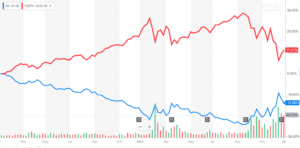Business & Money
When you buy a stock, or take a long position, your maximum downside is your initial investment. So if you buy a share of stock for $10, you can lose a maximum of $10 if it somehow goes to zero.
By contrast, when you sell a stock short, the downside is unlimited. So it’s far more risky to take short positions when compared to taking long positions.
I’ll give you a simple example to demonstrate in case anyone is confused about what it means to sell short. When you sell a stock short, you are borrowing shares in hopes the price will go down.
So let’s use that same $10 share of stock. If I borrow 1 share of stock today from Jack, I can then sell that share to Susan for $10. If the price then goes down to $5 tomorrow, I can buy a share for $5 and return it to Jack. So I sold the stock yesterday for $10, bought it back for $5 today to return it to Jack, and pocketed the $5 difference as my profit (in reality there is also a borrowing fee, essentially interest you are paying on the loan).
But, if the stock instead doubled to $20, I would have lost $10. Or if it tripled, I would lose $20. So the more the stock goes up, the more I stand to lose.
So, due to the risky nature of shorting stocks, and my limited knowledge and experience trading, I have never shorted a stock. (I got pretty close with SnapChat – should have pulled the trigger)
That changed a few weeks ago. Well, I guess you would say it kind of changed, given that I shorted the overall market as opposed to an individual stock. And I did it in a way that I didn’t realize was possible. Specifically, I came across the concept of an inverse ETF. That is, there are inverse exchange-traded funds that seek to provide -100% of the return of the target fund.
So you can buy SPY, which is an ETF that seeks to match the return of the S&P 500. Or you can buy SH, which is an inverse ETF that seeks to provide the inverse return of the S&P 500. (the goal is for SH to go down the same amount that SPY goes up – you can see the 2-year chart of SPY vs SH below)

So you are basically shorting the overall market, but the risk profile is similar to that of a long position given that you can only lose the amount of your initial investment.
Human Progress
If you have minor stomach pain, you might head to WebMD to do a bit of homework before perhaps taking a trip to Rite Aid. If you feel a throbbing pain in your head and blurred vision, you might want to head to the doctor, or better yet a neurologist.
Similarly, if you are establishing an LLC on the side to do a bit of consulting, you might be ok using LegalZoom and TurboTax for your legal and tax requirements. If you are leading a 1,000 person company with offices in 3 countries, you need a group of lawyers, accountants, and a CFO to ensure that all your bases are covered.
In other words, when complexity and the stakes are low, you can handle things yourself with the help of software. When complexity and the stakes are high, you need people, or better yet professionals.
I point this out because I keep getting the same question over and over from lots of different people.
How do you feel about robo-advisors? (automated software to handle passive investing)
If you’re opening up your first brokerage account and want to get your investing feet wet with a couple hundred or a couple thousand dollars, that equals low complexity and low stakes. So sure, tools like WealthFront and Betterment might be great options to “set it and forget it.”
If you have tens or hundreds of thousands of dollars laying around, the stakes are higher. And if you also have considerations like having kids or purchasing property, that adds significant complexity. So it might be time to speak to the professionals (all of which are not created equal).
Philosophy
Perhaps we’ll continue on this same thread as we move into the philosophy section.
Want to know what else is high stakes and high complexity? How about human choice and free will?
I read a fantastic article recently wherein the author had this to say of Google,
The search engine is no longer a model of human knowledge, it is human knowledge. What began as a mapping of human meaning now defines human meaning, and has begun to control, rather than simply catalog or index, human thought. No one is at the controls.
While it’s easy to focus on the internet giants given their massive scale and pervasiveness, the underlying fact is that more and more of our decisions are being made for us, and often when the stakes are high. Spotify wants to decide what we listen to. Seamless and Yelp want to decide where and what we eat. YouTube and Netflix want to decide what we watch. Robo advisors want to decide how we invest.
Perhaps this is just nature’s response to the havoc that humanity has reeked on the planet. Give us the tools we need to build machines that we ultimately lose control over, which eventually leads to some massive shock to the system in order to press reset.
My Latest Discovery
You have got to be kidding me! I know have a total of 4 GREY HAIRS in my beard!!